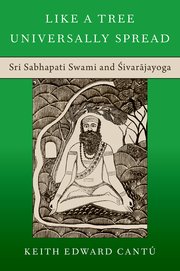Oxford University Press announced the release of the latest title in its Oxford Studies in Western Esotericism series, Keith Cantú’s “Like a Tree Universally Spread: Sri Sabhapati Swami and Śivarājayoga.” The posted description says:
This book examines the life of a nineteenth- to early twentieth-century Tamil yogin named Sri Sabhapati Swami (Śrī Sabhāpati Svāmī or Capāpati Cuvāmikaḷ, ca. 1828-1923/4) and his unique English, Tamil, Hindi, and Bengali literature on a Sanskrit-based system of yogic meditation known as the “Rājayoga for Śiva” (Tamil: civarājayōkam, Sanskrit: śivarājayoga), the full experience of which is compared to being like a “tree universally spread.” Its practice was based on a unique synthesis of Tamil Vīraśaiva and Siddhar cosmologies in the colonial period, and the yogic literature in which it is found was designed to have universal appeal across boundaries of caste, gender, and sectarian affiliation. His works, all of which are here analyzed together for the first time, are an important record in the history of yoga, print culture, and art history due to his vividly-illustrated and numbered diagrams on the yogic body with its subtle physiology.
This book opens with a biographical account of Sabhapati, his editor Shrish Chandra Basu, and his students as gleaned from textual sources and the author’s ethnographic field work. Sabhapati’s literature in various languages is then analyzed, followed by a comprehensive exposition of his Śaiva cosmology and religious theories. Sabhapati’s system of Śivarājayoga and its subtle physiology is then treated in detail, followed by an analysis of Sabhapati’s aesthetic integration of aural sound and visual diagrams and an evaluation of the role of “science” in the swami’s literature. Sabhapati also appealed to global authors and occultists outside of South Asia, so special attention is additionally given to his encounter with the founders of the Theosophical Society and the integration of his techniques into the thelemic “Magick” of Aleister Crowley, the German translation of Bavarian theosophical novelist Franz Hartmann, and the American publication of New Thought entrepreneur William Estep. To these are appended a never-before-translated Tamil hagiography of Sabhapati’s life, a lexicon in table-form that compiles some archaic variants and Roman transliterations of technical terms used in his work, and a critically-edited passage on an innovative technique of Śivarājayoga that included visualizing the yogic central channel as a lithic “pole.”

